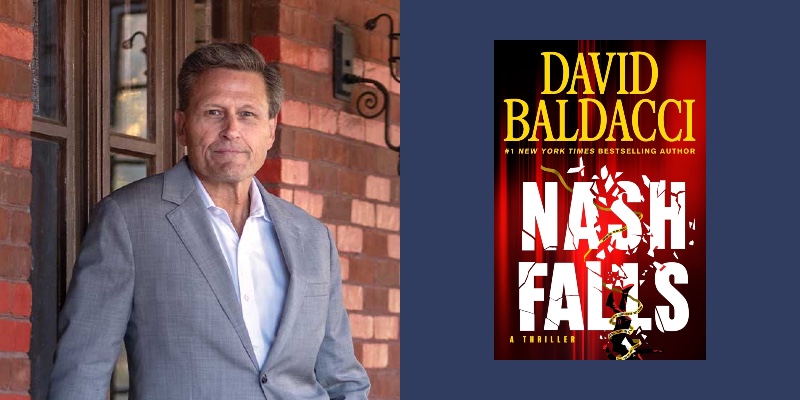When you’ve been in the writing business as long as I have, the one thing you need to constantly search for are stories that will challenge you as a novelist, get you out of your comfort zone, make you attempt things you’re not sure you can pull off. My forthcoming novel Nash Falls, and its sequel, Hope Rises, accomplished these things for me. Nash Falls begins with a question at its core: what would you do if your normal, everyday life was suddenly destroyed by forces outside of your control, or even your comprehension? What if you were the wrong person at the wrong time, for all the wrong reasons?
To be clear, this was not like Amos Decker, or Aloysius Archer, two of my fictional detectives, who got saddled with working on a case because that’s what detectives do. Or my assassin Will Robie heading out on a mission. This is Walter Nash, a normal hardworking businessman who is as far from the world of intrigue and murder as it’s possible to be.
He asked for none of the things I put him through in the novel, so I had to approach this differently from many of my others. This entailed showing a deeper, introspective side of Nash’s character as he tries to make sense of the insensible, to muster the courage to even think that he could survive what I put him through. And unlike many of my other characters, he didn’t bring ready-made skills to the fight. He had to learn them on the fly and do the best he could with what he had.
So, this was new territory for him, and new territory for me. I had to walk a different line in putting him together, taking time to let him authentically realize the plight he was in, and how he might possibly survive it. Unlike the seasoned Decker he didn’t have the might of the FBI behind him. Unlike Robie, he couldn’t let a trigger pull on a long-range rifle do the talking for him. Unlike Archer, he didn’t possess the hard-earned skills of a gumshoe detective walking the mean streets of LA for years and learning all the tricks of the trade.
With Walter Nash I had simply dropped an infant into a thriller. Now he had to be reborn. To become not only what he needed to become to survive, but to provide justice where it was due, and for those to which it was due.
While writing the novels, I was terrified that I might not be able to achieve the goals I had set for myself. But fear is a great motivator. It is for Nash, and it was for me in writing them.
One of the most difficult aspects in crafting Nash’s character was that his evolutionary arc had to be so broad and shape-shifting. I had to take a tall, skinny, physically weak man with no interest or skills in instilling pain on others, and transform him into Oliver Stone, the killing machine from my Camel Club series. And it wasn’t just the authenticity of the physical transformation that I had to be aware of, which is why I gave Nash fourteen months to transform himself. It was the emotional side of the equation as well. What I had to subtract from Nash, which I’ve never really had to take from my other characters, was his humanity. To rob the man of what made him, him.
It was a totally unique arc for me, and it pushed me to craft it in such a way that it wasn’t just David Banner turning into the Hulk with the result that he could walk into any situation and kick ass – fun and cool to read about, but not by any stretch the most important facet of what I was trying to achieve.
I had to make you both root for Nash and feel saddened for him, for having to become the Hulk when all he ever wanted to be was not the Hulk. Superheroes become very vanilla if they want to be superheroes. It’s the ones who would rather be anything but who are the really interesting character studies.
I wanted to see if–when you’ve lost everything, you really are capable of anything. And that was a scary process for me, because if I pushed the pedal to the metal too hard, I might end up with a rampaging monster with no moral center. Too light on the gas and I would be left with a character caught between two worlds, and legitimately belonging to neither.
This is probably the most intense and gut-wrenching novel I’ve ever written. I think every reader will be able to relate to the challenges of suddenly seeing your very familiar and comfortable world irreversibly upended in ways big and small.
And then you have to ask yourself this: How far would you go to avenge your loved ones? Not just waiting for the police to arrest the perpetrators, but you, you becoming judge, jury and executioner.
That is the question that confronts Walter Nash over the course of the two novels, and the question that drove me in creating this duology.
Nash makes mistakes and he says things he shouldn’t and, unlike some of my other characters, he has enormous self-doubt as he walks the hellish road I’ve set him on. But I always have a goal with each of my characters, and the goal for Nash was much like my other novels: finding the truth and imposing accountability. I think readers seek out my books because in the pages they can discover results they can’t often find in real life. I would much prefer that justice and accountability happen in real life with greater frequency than they sometimes do. But finding it in these pages has worth too. Because then, suddenly, people start clamoring for it more in the real world.
If it can work in fiction, it can work anywhere.

















